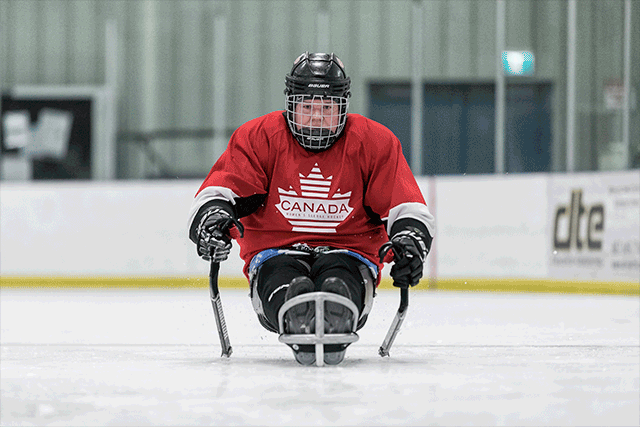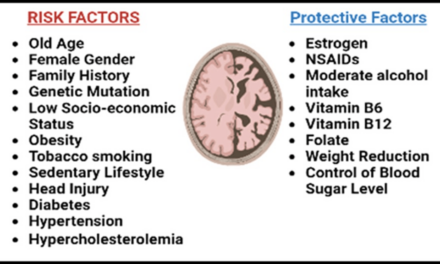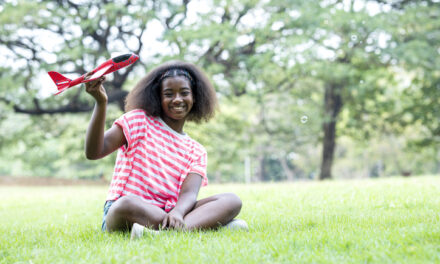As a veteran Canadian para hockey player, Dr. Peggy Assinck’s goal is to grow the sport internationally and ensure women have a chance to play the game she loves
Growing up, Dr. Peggy Assinck was very athletic. She was not yet identified
as being born with spina bifida—a congenital defect of the spine—so she was
entirely able-bodied and played a variety of sports.
That’s why when she experienced complications from her condition and became
paralyzed from the waist down at age 11, she felt like she lost a bit of
her identity.
“It was really difficult to be honest with you, because I think I really
self-identified as an athlete,” Assinck, 38, says. “My parents really
wanted to find a way to have me be involved in sport, despite the fact that
I was dealing with ongoing medical and paralysis-below-my-waist issues.”
A recreational therapist recommended she try one of the only adaptive
sports near Peterborough, Ont., at that time: para hockey. Assinck and her
family travelled 90 minutes away from home to try the sport for the first
time. Although it wasn’t necessarily love at first skate, she was thrilled
to meet other kids just like her.
“Because I grew up in such a remote community, I’d never met anyone else in
a wheelchair or anyone else using adaptive equipment,” she says. “That was
pretty cool just to meet other disabled kids.”
With time, her passion for para hockey grew and flourished. Now one of the
veterans with Canada’s national women’s para hockey team, Assinck’s goal is
to ensure other women and girls around the world have an opportunity to try
the sport she has dedicated her life to.
Ensuring positive experiences for women
One thing Assinck emphasizes is ensuring positive experiences for women
when they try para hockey for the first time. As the women’s team holds its
selection camp in Yellowknife, N.W.T., from April 25-30, a grant from the
Hockey Canada Foundation will assist with providing try-it opportunities
and grassroots sessions in the community.
“I want to make sure that more kids and more people who sustained new
injuries are getting a good first-contact experience,” Assinck says. “I
think the Hockey Canada Foundation grant really helps for the women’s para
hockey team to do that in remote communities [and] to help support
female-specific programming.”
We believe as a Foundation that girls grow when they play hockey and
hockey grows when girls play,” says Alexandra Wise of the Hockey Canada
Foundation.
“Working with an organization like Women’s Para Hockey of
Canada is something that allows us to align our missions and keep
developing the game from a grassroots level, but then also at a higher
level,” Wise adds.
 It’s no coincidence that wherever Assinck has gone in her life, women’s
It’s no coincidence that wherever Assinck has gone in her life, women’s
para hockey has grown with her guidance and support. Inspired by wanting to
learn more about spina bifida, she attended Brock University to pursue a
neuroscience degree. As she completed her undergraduate degree, she played
with the Niagara Thunderbirds and volunteered with the Brock Niagara
Penguins, a sporting program for youth and young adults with a physical
disability.
Upon her graduation in 2008, Assinck began her master’s degree and
completed her PhD in neuroscience at the University of British Columbia.
Looking to continue training as an elite para hockey athlete, she searched
for a club team to join in her new home province.
“After growing up in southern Ontario, where para ice hockey was
everywhere, I was quite surprised at how little para ice hockey was in
British Columbia as a whole,” she says.
Once she joined a team based out of Surrey run by SportAbility, Assinck
helped to create new para hockey programs in Vancouver and Victoria, and
aided in making opportunities across the province to try the sport. From
there, she helped to organize a provincial team with support from BC
Hockey.
Traveling across the pond
A postdoctoral fellowship took Assinck overseas in 2017 to the University
of Edinburgh and the University of Cambridge. There were a handful of club
programs in Great Britain when she moved, and the Canadian quickly joined
the closest team to her—the Manchester Mayhem—to continue training.
“I’ve been participating as an athlete on that club team for a while, but I
think it became pretty clear that I had a lot of expertise in para hockey,
and I got asked about a year into playing here to join as the assistant
coach on [Great Britain’s] men’s para ice hockey team,” she says.
Assinck traveled with Team Great Britain to the IPC World Para Hockey
Championship, B Pool, in 2019 in Germany.
“I think I was probably the only athlete who was also a coach, I was
probably the only female who was also a coach,” she says. “It was a really
amazing opportunity to just be on the bench and to help to support the
men’s program in what they were doing and in their goals.”
With the addition of coaching on her résumé, a new opportunity presented
itself in 2021: the International Paralympic Committee approached the
coaches of Great Britain’s men’s para hockey team to ask if they would
create a women’s team.
I suddenly found myself with the opportunity to create a team in another
country… and it just seemed like the right space for me,” Assinck says.
Assinck quickly got to work. She put out a call for athletes with
lower-body disabilities living in Great Britain, interviewed potential
players and selected 27 athletes —most of whom had never played para hockey
before—for the new program.
Although Assinck was leading the charge overseas, she continued to receive
support from Team Canada staff back home. One of the difficulties she
encountered was a lack of ice time, meaning she was often teaching a group
of athletes how to play hockey without being on the ice.
“She’s spending time in classrooms teaching them the basics of hockey,”
says Tara Chisholm, head coach of Canada’s national women’s para hockey
team. “She’s renting out gymnasiums so they can do floor hockey and learn
about systems that way. She’s literally pulling everything she can together
to teach these athletes how to be hockey players in a space that really is
not intended to flourish for hockey players.”
Despite the limited resources and the challenges of creating a new team
during the COVID-19 pandemic, the newly formed Great Britain national
women’s team is prepped to compete at its first international event, the
IPC Women’s World Challenge, this fall.
“I honestly do not know how she does everything that she does,” Chisholm
says. “I’m very grateful for all the work that she has done that goes
unnoticed and that has essentially helped to develop women’s para hockey to
where it is right now.”
Growing the game in Canada and beyond
As she created the team, Assinck put together a document of how she
kickstarted the program with the goal to share it with other countries so
they can replicate the processes.
“That is the big goal right now, to not only grow the game within our
borders of Canada, but then to make sure that other girls and women with
disabilities across the world have the opportunity to play the sport of
hockey,” Chisholm says.
“In order to be in the Paralympics, we need more countries to create
teams,” Assinck adds. “We just want to make sure that they have a great
first experience and that we’re creating a sustainable program that can
continue for many, many years.”
I’m a true believer that if I hadn’t been involved in [para hockey] when I was young, when I was going through the struggles that I had, I wouldn’t be the person I am today,” Assinck says.
Although it’s a bit of an odd position to play against the team you created
in competition, Assinck had the full support of her British colleagues to
return to Canada and prepare for the Women’s World Challenge. Despite
everything she has done to grow the sport, she still prioritizes being the
best athlete she can be and she trains hard to earn the privilege of
wearing the Maple Leaf on her chest.
She hopes people see her as someone who has dedicated a lot of her life and
finances to being an elite athlete, and someone who has gone over and above
to support women and para hockey in Canada and around the world. It’s the
least she could do for a sport that has changed her life.
“I’m a true believer that if I hadn’t been involved in [para hockey] when I
was young, when I was going through the struggles that I had, I wouldn’t be
the person I am today,” she says. “I wouldn’t have the confidence to be up
speaking in front of thousands of people about neuroscience or even the
confidence to be able to be jumping around from team to team in some of my
coaching roles.
“I’m hoping that I can look back and feel like I did everything I possibly
could to make sure that people with disabilities, particularly women with
disabilities, are getting exposure to the sport that means so much to me
and could mean so much to them.”



